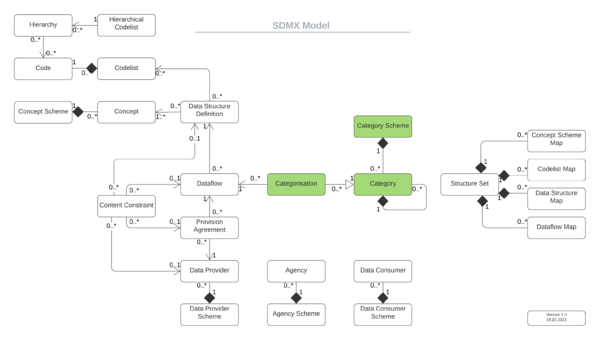Difference between revisions of "Category Scheme V10"
| (7 intermediate revisions by 2 users not shown) | |||
| Line 1: | Line 1: | ||
| − | [[Category:SDMX | + | __NOTOC__[[Category:SDMX 2.1 StructuresV10]] |
| − | [[Category:SDMX | + | [[Category:SDMX 2.1 Structures]] |
=Overview= | =Overview= | ||
A Category Scheme is a container for [[Category|Categories]]. An example of a category scheme is one which categorises data - sometimes known as a subject matter domain scheme or a data category scheme. The individual Categories can be associated to any set of identifiable Artifacts, known as a Categorisation. | A Category Scheme is a container for [[Category|Categories]]. An example of a category scheme is one which categorises data - sometimes known as a subject matter domain scheme or a data category scheme. The individual Categories can be associated to any set of identifiable Artifacts, known as a Categorisation. | ||
| Line 10: | Line 10: | ||
|- | |- | ||
! scope=row style="text-align: left;" | Maintainable | ! scope=row style="text-align: left;" | Maintainable | ||
| − | | [[ | + | | [[Maintainable_V10|Yes]] |
|- | |- | ||
! scope=row style="text-align: left;" | Identifiable | ! scope=row style="text-align: left;" | Identifiable | ||
| − | | [[Identifiable|Yes]] | + | | [[Identifiable V10|Yes]] |
|- | |- | ||
! scope=row style="text-align: left;" | Item Scheme | ! scope=row style="text-align: left;" | Item Scheme | ||
Latest revision as of 01:56, 27 March 2024
Overview
A Category Scheme is a container for Categories. An example of a category scheme is one which categorises data - sometimes known as a subject matter domain scheme or a data category scheme. The individual Categories can be associated to any set of identifiable Artifacts, known as a Categorisation.
Structure Properties
| Structure Type | Standard SDMX Structural Metadata Artefact |
|---|---|
| Maintainable | Yes |
| Identifiable | Yes |
| Item Scheme | Yes |
| SDMX Information Model Versions | 2.0, 2.1 |
| URN - CategoryScheme namespace | urn:sdmx:org.sdmx.infomodel.categorycheme.CategoryScheme |
| URN - categorisation namespace | urn:sdmx:org.sdmx.infomodel.categorycheme.Categorisation |
Context within the SDMX 2.1 Information Model
Usage
Categories are used within a Category Scheme and has the facility to have one or more child codes as well as being multi-lingual.
The SDMX Cross Domain Concept Scheme provides a range of standardised Concepts maintained by the SDMX Statistical Working Group (SWG) and can be viewed on the Global Registry site https://registry.sdmx.org/items/conceptscheme.html.
More information on Category schemes can be found in this article.
Conventions
Category Scheme IDs IDs are conventionally uppercase using underscores '_' as separators if required. Examples:
| Agency | Category Scheme ID ID | Description | SDMX-ML |
|---|---|---|---|
| ESTAT | ESA2010TP | ESA 2010 - Transmission programme | [ https://registry.sdmx.org/ws/public/sdmxapi/rest/categoryscheme/ESTAT/ESA2010TP/1.0 SDMX-ML] |
| SDMX | STAT_SUBJECT_MATTER | SDMX Statistical Subject-Matter Domains | [ https://registry.sdmx.org/ws/public/sdmxapi/rest/categoryscheme/SDMX/STAT_SUBJECT_MATTER/1.0 SDMX-ML] |
Flat Category Schemes
Flat Category Schemes are simple lists of codes with no explicit or implied relationships or hierarchies.
Example Category Scheme
| Code ID | Code Name | Description |
|---|---|---|
| PUBLIC | Public Sector | Artifacts relating to the Public Sector. |
| PRIVATE | Private Sector | Artifacts relating to the Private Sector |
Category Schemes with Simple Hierarchies
SDMX allows simple hierarchies to be defined within flat Concept Schemes by making a code the parent of codes that logically sit under it in the hierarchy.
Example: SDMX STAT_SUBJECT_MATTER
| Code ID | Code Name | Parent |
|---|---|---|
| DEMO_SOCIAL_STAT | Demographic and social statistics | (none) |
| POP_MIGRATION | Population and migration | DEMO_SOCIAL_STAT |
| LABOUR | Labour | DEMO_SOCIAL_STAT |
| EDUCATION | Education | DEMO_SOCIAL_STAT |
A Category can only have one parent meaning that it can only appear once in a simple Category Scheme hierarchy.
